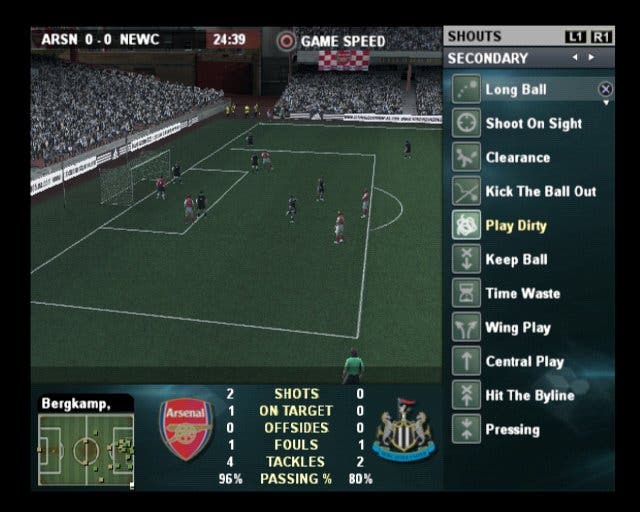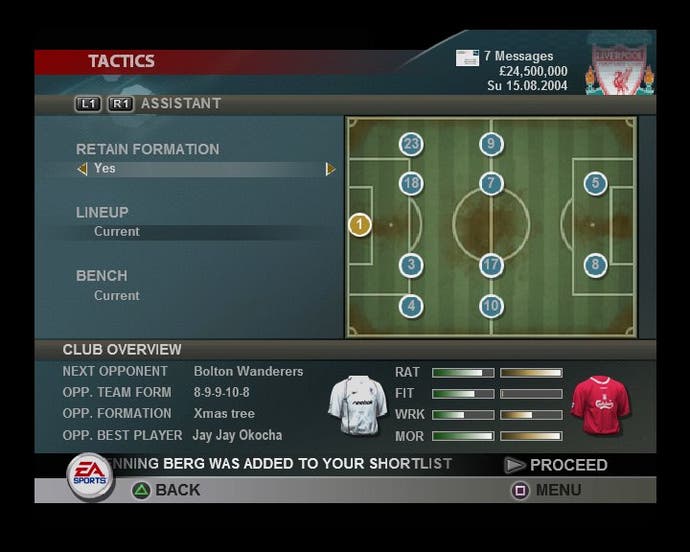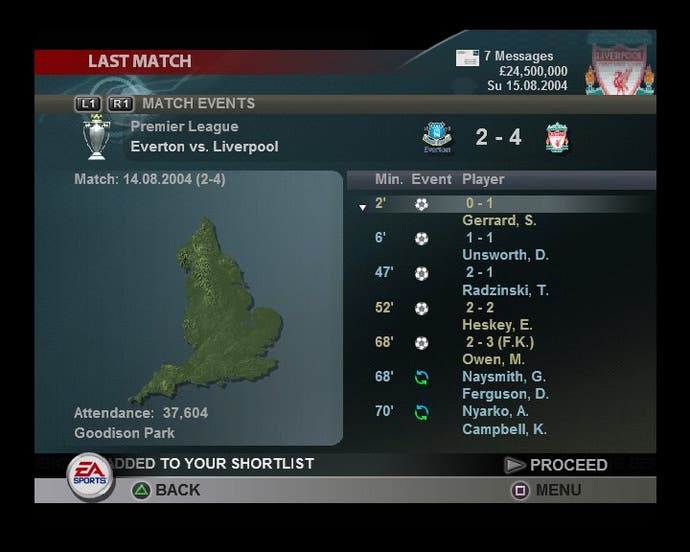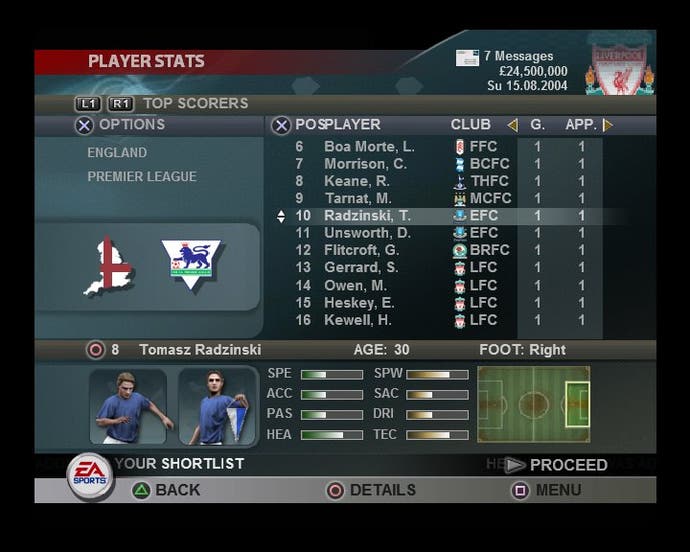Total Club Manager 2005
Proof more than ever that football management can work on a console.
We was robbed! (Of our youth, that is.)
Like many football fans who are also gamers, the Championship Manager series has devoured months of my life. I have been gobbled up by that monster too many times to admit ... gobbled up, slowly digested, and then regurgitated for a bewildered rat race to nibble away at.
"Why so bleary-eyed?" asks the student rat.
"I stayed up all night trying to sign Robbie Fowler from the scousers."
"Umm ... right," replies the student rat, pecking away. "Good luck with that. Bye."
Champing at the bit

It might seem unfair to open a review of Total Club Manager 2005 with reference to the genre's longstanding, undisputed masterpiece, but that's actually not the case. You see, Championship Manager 2 is the Half-Life of management sims. If another game earns a favourable comparison, for whatever reason, then that game should be proud.
Total Club Manager earns that comparison. It may not be in the same league as the Champ Man of old, but at least it's level on goal difference. Okay, I'm beginning to sound like Ron Atkinson on morphine. Let me explain.
TCM 2005 gets a lot of things right. Much like Wayne Rooney doing a warm-up, the nice touches are apparent even before you start a game. You can choose to play as a 'fixed' team, whereby you won't be fired from that team regardless of performance; or you can choose to run six active leagues, with the possibility of getting work in any of them; and finally you can choose to be offered contracts by three random clubs in the lower divisions of a country, with the goal of taking them to the top. With 20 countries on offer, there's huge scope. For example, you could start off managing Liverpool in the Premiership, but have La Liga and Seria A running concurrently in case an offer from a big club comes in [you had to bring that up -scouser-loving Dep.Ed], with the Irish and Korean leagues in the background if you feel like a different challenge later.
I really like this idea of football management as an epic, global merry-go-round. Succeed and the climes of Milan may be your eventual destination, fail and you might have to resurrect your career in Swedish snow. Immediately, there's a sense of possibility about the game, a sense of drama in the offing. And, let's face it, real football management is fraught with drama. The average Premiership manager could have a soap opera built around him. They could call it Home and Away. (I'm so sorry).
Playing the PR game

What TCM does a particularly good job of is capturing the spirit of this drama. Once you are hired by a club, the first screen you'll see is the 'home' page, with a news ticker running along its bottom and a fixture list in the lower right. Most prominent, however, are two rating bars in the top right of the screen: those of 'board' and 'fan' approval. This gives you a sense of being watched, as if your every move is being measured up by supporters and suits alike.
Thankfully, that's not exactly the case. For the most part, the board and fans will react to results on the pitch and your responses to media interviews, which I'll get to in a moment. If they were to react to your every move, they'd be kept on their toes, because you make a lot of them in this game. TCM is extremely comprehensive with regards to running your chosen club, with almost too many facets to list in a review. You have full control over your team's training (down to specific days of the week); you can sign youth players and subsequently develop their best traits; you can organise the club's merchandise and expand the stadium; you can even make the club go public, so long as certain requirements are met. Not once did I find myself saying 'why can't I do this?' and, for the most part, I actually left my backroom staff take care of the non-football issues.
Being a United fan (there's only one United), I spent most of my time with them, and it was nice to see the likes of Rooney and Pique in the squad, in line with the latest transfers. Every player is extensively rated on a selection of skills, including the usual suspects like attacking and tackling. Added to that are clever personality traits, such as 'leader', 'feisty', 'reliable' and 'flexible', though the effects of those aren't always apparent in matches. Also, each player is given a 'current' overall rating and a 'potential' overall rating. So Rooney has a current level of 12 and a potential rating of 13, with Gianluigi Buffon the highest rated in the game, with 13.8 and 15 respectively.
Be a player

Of course, a player's skills only really come into use in matches. TCM uses a modified FIFA engine to show games in real-time, and while the effect is certainly a lot more atmospheric than in LMA 2005, it's no less boring after a while. Generally, the play is fairly scrappy and unrealistic, pretty much the same as watching two AI teams go at it in Pro Evo 4 or FIFA 2005. Your tactics definitely influence the result, but you'll need the patience of a drugged Mark Lawrenson to sit through matches at normal speed, while at double-speed the atmosphere (complete with proper team chants for some famous teams) is all but ruined. The alternative is to export the game to FIFA 2005 and decide the result there, which is a wonderful option for diehard FIFA fans, but a bit too much hassle for everyone else.
One nice feature of the real-time matches is the ability to watch performance ratings and make team changes while continuing to view the game. Also worth mentioning is the decent commentary by John Motson and Ally McCoist, which is brilliantly vague without ever sounding too inane.
Unfortunately, unlike LMA's excellent 'highlights' option, TCM's only lets you skip straight to match results, but at the expense of seeing any of the action. Still, a patient gamer will no doubt enjoy the fairly decent variety of goals on offer, even if one-on-ones are stupidly difficult to score from.
Much like LMA, Total Club Manager does a very good job of presentation, with nice fonts and club crests for what seems like every team. The music is also surprisingly good drum 'n' bass by the Perfecto Allstars, whoever they are. However, the best aspect of the game, I feel, is the way it attempts to recreate the little dramas of football. The most appropriate examples of this are the media interviews given during the course of the game, often before or after matches. Depending on the answer given, you might affect the morale of your team, the fans' opinion of you, or even your overall manager 'level', which improves depending on performance. Generally, a question is posed by a reporter (for example: "You're expected to hammer this team tonight, do you think this will happen?") with three possible responses. Some of these are beautifully Fergie-like, with the option to snap at the reporter or remain even-handed. The reporter will often show a response, too. "The reporter smiles, glad that he got you worked up."
Potential

There are many more little touches like this to be seen in the game. At one point, my club had signed a 15 year-old with great potential, but just two months later he quit the game for good, deciding it wasn't the life for him after all. Another time, while managing an Irish team, one of my players 'stopped looking at' another player after the latter had 'stolen' an advertising deal from him. At United, my business director cut 12 per cent off a deal to sign Iker Casillas - a small victory in itself. When he eventually did sign, the team's morale went up, because they were excited I had signed a world-class player.
Without doubt, this sense of drama and scope is the major difference between the likes of LMA and TCM. While LMA has some very good basics in place, TCM just takes the whole process one step farther, makes it that little bit more involving.
That's not to say it doesn't have its flaws, however. One of the most annoying is the inability to even talk to potential signings if your squad is already maxed out. You have to wait until the relevant transfer window opens, offload players (not always easy) and only then can you even inquire as to a player's availability. In fact, the transfer market isn't always as dramatic as it could be; the Casillas signing was accepted without bargaining, and without fuss, which is highly unlikely in real life, though other transfers were rejected outright and involved a bit of negotiation.
Also, while improving your ratings with the fans should be a goal, it seems you begin every game with the supporters "worshipping the ground you walk on". In other words, the only way is down from there, which is a little underwhelming.
On the ball
Still, despite a few misgivings, Total Club Manager 2005 is clearly a work of some effort by EA. It may not hold a scarf to the likes of Football Manager on the PC, but it can certainly play ball with CM3 on the Xbox, considering that game's poor optimisation and now-outdated stats. Especially patient fans of the FIFA engine will get more from it than other gamers, but even without the real-time matches this is a title that football fans will get plenty of fun from. In a niche genre, it's certainly a stylish outfit.
Oh well, back to the rat race.
